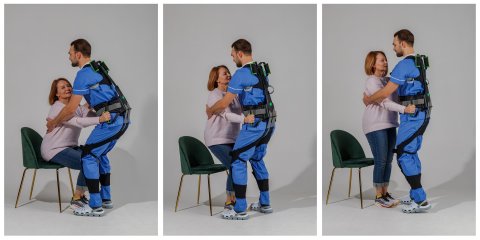The Musculoskeletal Disorder Care project involves researchers from the University of Galway and will test the effectiveness of exoskeletons for healthcare workers.
A new European project is investigating the use of exoskeletons by healthcare workers to improve their work and reduce the risk of injury.
The Musculoskeletal Disorder Care project (MSD-CARE) aims to improve the working conditions of healthcare staff through the use of exoskeletons. This has been prompted by studies that claim musculoskeletal disorders are significantly higher among healthcare staff than those working in other sectors.
Ireland’s Health and Safety Authority reported that healthcare sector workers represented roughly 21pc of work-related injuries in 2021.
The MSD-CARE project involves researchers from Germany, the Netherlands and Ireland’s University of Galway. A new exoskeleton research laboratory at the Göttingen Health Campus (GHC) is being used for the project, where carers can test their work with and without an exoskeleton. The research partnership received funding of more than €657,000 from the EU’s Interreg North-West Europe programme.
Advanced analysis tools will be used during these tests to assess the benefit these exoskeletons have on muscle activity and breathing. It is hoped the exoskeletons can support workers such as nurses, carers, physiotherapists and occupational therapists.
“Our assumption is that wearing exoskeletons during activities such as mobilisation or transfer of patients could improve the working conditions of care professionals and enhance patient safety,” said Dr Shiney Franz, a GHC professor and project director. “In this project, we aim to identify the working conditions in nursing that enable the integration of exoskeletons into the existing workflow, taking in account the care plan and goals.”
Prof Georgina Gethin of the University of Galway said nurses involved in direct patient care are subject to “physically demanding tasks” and suffer a higher rate of musculoskeletal problems than other healthcare workers as a result.
“This can have significant impact not only on their health but also on their ability to stay in their chosen profession,” Gethin said. “Any intervention that can help to highlight the issue of musculoskeletal disorders and find solutions to their prevention are a welcome development.
“In principle they could be a great asset it is important to know just how practical they would be in a busy work environment and how acceptable they would be to workers. We look forward to delivering on this for nurses and other healthcare workers.”
Last year, SiliconRepublic.com spoke to Ronan Langan about his work leading the DCU Exoskeleton Programme, a physiotherapist-led service that supports people with reduced mobility to walk using exoskeletons.
Leigh Mc Gowran
This article originally appeared on www.siliconrepublic.com and can be found here
A new European project is investigating the use of exoskeletons by healthcare workers to improve their work and reduce the risk of injury.
The Musculoskeletal Disorder Care project (MSD-CARE) aims to improve the working conditions of healthcare staff through the use of exoskeletons. This has been prompted by studies that claim musculoskeletal disorders are significantly higher among healthcare staff than those working in other sectors.
Ireland’s Health and Safety Authority reported that healthcare sector workers represented roughly 21pc of work-related injuries in 2021.
The MSD-CARE project involves researchers from Germany, the Netherlands and Ireland’s University of Galway. A new exoskeleton research laboratory at the Göttingen Health Campus (GHC) is being used for the project, where carers can test their work with and without an exoskeleton. The research partnership received funding of more than €657,000 from the EU’s Interreg North-West Europe programme.
Advanced analysis tools will be used during these tests to assess the benefit these exoskeletons have on muscle activity and breathing. It is hoped the exoskeletons can support workers such as nurses, carers, physiotherapists and occupational therapists.
“Our assumption is that wearing exoskeletons during activities such as mobilisation or transfer of patients could improve the working conditions of care professionals and enhance patient safety,” said Dr Shiney Franz, a GHC professor and project director. “In this project, we aim to identify the working conditions in nursing that enable the integration of exoskeletons into the existing workflow, taking in account the care plan and goals.”
Prof Georgina Gethin of the University of Galway said nurses involved in direct patient care are subject to “physically demanding tasks” and suffer a higher rate of musculoskeletal problems than other healthcare workers as a result.
“This can have significant impact not only on their health but also on their ability to stay in their chosen profession,” Gethin said. “Any intervention that can help to highlight the issue of musculoskeletal disorders and find solutions to their prevention are a welcome development.
“In principle they could be a great asset it is important to know just how practical they would be in a busy work environment and how acceptable they would be to workers. We look forward to delivering on this for nurses and other healthcare workers.”
Last year, SiliconRepublic.com spoke to Ronan Langan about his work leading the DCU Exoskeleton Programme, a physiotherapist-led service that supports people with reduced mobility to walk using exoskeletons.
Leigh Mc Gowran
This article originally appeared on www.siliconrepublic.com and can be found here



